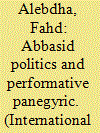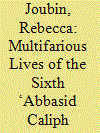|
|
|
Sort Order |
|
|
|
Items / Page
|
|
|
|
|
|
|
| Srl | Item |
| 1 |
ID:
178033


|
|
|
|
|
| Summary/Abstract |
The poet ʿAli ibn Jabala, also called al-ʿAkawwak, was a little known but significant poet who lived during the late 8th and early 9th centuries. This article examines his poetry in its political and cultural context to delineate the literary devices exploited by the poet in his poems of praise. Moreover, this paper interprets existing prose anecdotes claiming that al-ʿAkawwak's panegyric poem to the caliph al-Maʾmun's commander, Abu Dulaf al-ʿIjli, made the caliph so furious that he ordered the poet's execution, despite the poet having never composed any verses overtly criticizing the caliph. The argument is made that, within the tense political atmosphere of the time, the style that the poet embraced in praising the two commanders, Abu Dulaf al-ʿIjli and Humayd al-Tusi, intensified al-Maʾmun's anger toward the poet.
|
|
|
|
|
|
|
|
|
|
|
|
|
|
|
|
| 2 |
ID:
175799


|
|
|
|
|
| Summary/Abstract |
A vast array of narratives found in medieval historical chronicles and literary sources have referenced the particular ways in which the culture associated with the ‘Abbasid caliphate diverged from a binary model of gender. Despite debate about the historical accuracy of these early chronicles, the repeated references to the sixth ‘Abbasid caliph Muhammad al-Amin's non-heteronormativity indicate at least a kernel of truth. This article examines the collective memory construction of al-Amin in the Egyptian series Harun al-Rashid (1997) and two Syrian series, Abna’ al-Rashid: al-Amin wa-l-Ma'mun (The Sons of al-Rashid: al-Amin and al-Ma'mun, 2006) and Harun al-Rashid (2018). These contemporary portrayals of the life of al-Amin simultaneously illustrate the process by which history is altered by authorial perspective and the erasure of nonheteronormative space within the ‘Abbasid caliphate. My own authorial perspective inclines toward an interpretation of al-Amin as queer; through this lens, an inspection of wide-ranging accounts of al-Amin's life reveals the historical biases of his time and our current moment, too, as historians then and now variably recognize al-Amin's queerness in constructing collective memory. Some have argued that anti–al-Amin chroniclers may have engaged in historical revisionism and referred to al-Amin as queer to discredit the caliph, but ultimately, whether or not this is true, the current application of those early references by contemporary screenwriters is the most revealing historiographical decision, as his many representations serve as a mirror for our contemporary subjectivities, interests, and agendas. At a time when queer lives and experiences are notably absent from traditional historical narratives, this article proposes that regardless of the accuracy of the original sources, the absence itself in contemporary portrayals is significant, as patterns of exclusion yield tangible meaning. In this particular case, the ready elimination of queerness from contemporary narratives shows the ways in which queerness is vulnerable to erasure in favor of other, more politically expedient identity characteristics and values.
|
|
|
|
|
|
|
|
|
|
|
|
|
|
|
|
|
|
|
|
|